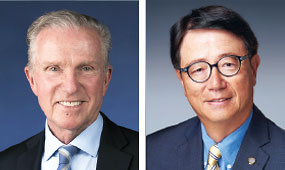What Do IMGs Need and How Can They Be Supported?
Abstract
International medical graduates are the backbone of psychiatry, and have experiences and needs that differ from their U.S. counterparts.
International medical graduates (IMGs) comprise a quarter of the physicians and a third of the psychiatrists in the United States. More than a fourth of psychiatry trainees are IMGs. What’s more is that IMGs are the lifeblood of our mental health system, particularly in the public sector. Every year the Annual Meeting showcases excellent programming by and for IMGs (and for the many, interested others), and this year is no exception. We are excited to highlight here four standout sessions:
The IMG Journey: Snapshots Across the Professional Lifespan (May 21, 8 a.m.-9:30 a.m.)
In this highly interactive session, Vishal Madaan, M.D., Muhammad Zeshan, M.D., Naziya Hassan, M.D., and Consuelo C. Cagande, M.D.—who range in their careers from a resident to senior professor—will cover themes of acculturation, mentor-mentee relationships, supervision, unique issues in psychotherapy, career trajectories, and much more.
International Medical Graduates and the Care of Older Adults With Mental Health Disorders in the United States (May 22, 1:30 a.m.-3 p.m.)
Although IMGs make up almost half of the workforce of geriatric psychiatrists in this country, our population is aging, and more trained geriatric psychiatrists are sorely needed. In this session, Rajesh R. Tampi, M.S., M.D., will review the roles of IMGs as private practitioners, educators, academicians, and researchers and talk about ways APA can work to attract more IMGs into the geriatric field.
Supporting IMGs Throughout Their Careers (May 24, 10:30 a.m.-noon)
Since the pandemic began, IMGs are reporting disproportionate rates of burnout and dying by suicide at higher rates than ever before. They often do not receive the same resources as domestic psychiatrists. In a small group discussion with APA CEO and Medical Director Saul Levin, M.D., M.P.A., and early career psychiatrist and APA Scientific Program Committee member Elie Aoun, M.D. IMGs will have an opportunity to discuss the unique challenges they face and brainstorm ways in which APA might be able to assist.
Double Minorities: Exploring Systemic Barriers Against Non-U.S. International Medical Graduates in Academic Psychiatry (May 25, 1:30 p.m.-3 p.m.)
Chair Ramotse Saunders, M.D., and presenters Muniza A. Majoka, M.B.B.S., and Ali Maher Haidar, M.D., will review general stresses for IMGs but also specific issues for women and members of racial/ethnic minorities and the LGBTQ community. They invite attendees to engage with them in a far-ranging discussion to facilitate and foster academic careers for IMGs including peer and intergenerational mentoring, ally training, implicit bias training, and anti-racism/sexism initiatives.
We hope to see you at APA’s Annual Meeting in May! Please join us as we celebrate IMGs’ successes through the years and identify ways that APA can better support them. ■




